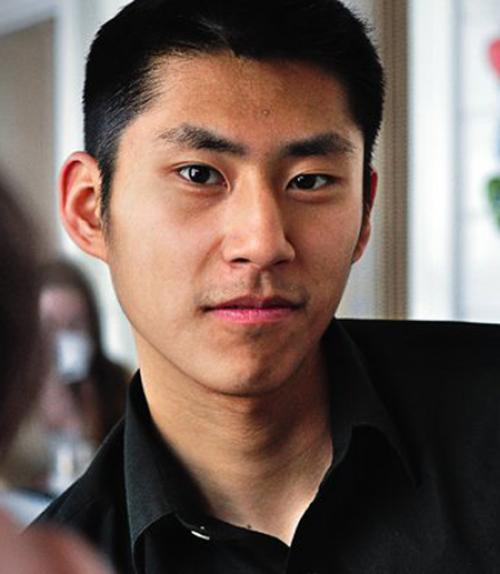If Gabe Otte ‘11 hadn’t had a Cornell advisor who steered him down a more challenging path and hadn’t had some chance conversations with Nobel Prize-winning chemist Roald Hoffman, he might be squirreled away in a lab somewhere.
Instead, he’s the CEO of Freenome, a start-up just awarded $5.5 million in venture capital for its product, a data-driven blood test that can detect various types of cancers in their earliest stages and recommend the best treatments.
Otte came to Cornell planning to study computer science, but a freshman-year advisor encouraged him to choose another major.
“I had been coding and programming since I was nine years old,” Otte said, so he elected to study chemistry and computational biology, using his knack for computer science to do his homework.
“I fell in love with chemistry when I took organic chemistry,” he said, adding that he developed his own computer program to do computations related to the synthesis of molecules. “I’m not sure my professor would have approved of that.”
Otte ended up doing research in the lab of Chris Schaffer, associate professor of biomedical engineering. He was also supported by Laurel Southard, director of undergraduate research at Cornell, and Pamela Davis-Acey, former program coordinator for Cornell’s Hughes Scholars Summer Research Program, which Otte took part in as a Howard Hughes scholar.
“The ability to be a chemistry major while still being able to do research in CS and BME is the exact interdisciplinary nature of Cornell that I love so much and helped form my unique way of thinking,” he said.
Along with the academics that set him up for a career combining machine learning, data analysis, chemistry and molecular biology, Otte said his Cornell classes taught him other important lessons.
“I think I was sitting in Baker 200 when a professor told us, ‘Even though you’re at Cornell with access to some of the brightest minds the world has to offer, the most important thing you should take away from your time here is that you’re capable of doing much more than society says you’re capable of,’ ” Otte remembers. “Success is more than getting a job and staying there for 40 years. You can do more. You can do things in a different way.”
Talks like those, as well as conversations with Hoffman, left Otte emboldened to take risks and dream big.
“Most scientists know that you do science in an incremental way and build on the work that came before you,” Otte said. “But Hoffman said it’s OK to start with a crazy idea first and then work back to the present to see how you can get there.”
The crazy idea that Otte started with was an implantable DNA sequencer that could communicate with the Cloud and alert patients when a cancer began to develop in their bodies. That’s not so far off from what the company is developing now.
Freenome’s blood test uses computational biology to analyze cell-free genetic samples and detect cancer in its earliest stages. The hope is that patients could take the test as part of their routine annual physicals.
That could make a huge difference in the number of cancer deaths, Otte said, since most cancers are treatable if caught in the early stages. Current tests aren’t successful in detecting certain types of cancers early on, particularly ovarian and pancreatic cancers and glioblastoma, he said. Freenome’s test could also help eliminate unnecessary worry and surgeries since the test would offer more detailed results: for example, whether a prostate cancer is indolent or aggressive, Otte said.
The company is working on several papers to publish this summer, as well as on pre-market reviews with the Food and Drug Administration and the Centers for Medicare and Medicaid Services. They’re also developing various academic collaborations and aim to have their first tests available in one-two years. Otte’s co-founders are Charles Roberts, a medically trained health technology serial entrepreneur and Riley Ennis, a Thiel Fellow who created a cancer vaccine with his previous company.
While Freenome employees spend much of their time on the science and math behind the product, Otte said they also spend a significant time talking about logic and about philosophy, a topic he also studied extensively at Cornell.
“It’s really easy when you’re doing research to lose sight of what you’re doing and forget that publishing the paper is not the goal,” he said. “Half the conversations we have at Freenome headquarters are philosophical in nature. Why do we need to make this test more cost effective and accessible to people?”




